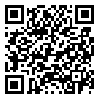Tue, Feb 24, 2026
[Archive]
Volume 12, Issue 1 (Winter 2026)
JCCNC 2026, 12(1): 59-70 |
Back to browse issues page
Download citation:
BibTeX | RIS | EndNote | Medlars | ProCite | Reference Manager | RefWorks
Send citation to:



BibTeX | RIS | EndNote | Medlars | ProCite | Reference Manager | RefWorks
Send citation to:
Khalkhali M, Jabbarzadeh Tabrizi F, Seyyed Rasooli A, Sarbakhsh P, Khajehgoodari M. Nurses’ and Patients’ Perspectives on Missed Nursing Care in Hospitals Affiliated With Tabriz University of Medical Sciences, Tabriz City, Iran. JCCNC 2026; 12 (1) :59-70
URL: http://jccnc.iums.ac.ir/article-1-801-en.html
URL: http://jccnc.iums.ac.ir/article-1-801-en.html
Mahsa Khalkhali1 

 , Faranak Jabbarzadeh Tabrizi *2
, Faranak Jabbarzadeh Tabrizi *2 

 , Alehe Seyyed Rasooli1
, Alehe Seyyed Rasooli1 

 , Parvin Sarbakhsh3
, Parvin Sarbakhsh3 

 , Mohammad Khajehgoodari1
, Mohammad Khajehgoodari1 




 , Faranak Jabbarzadeh Tabrizi *2
, Faranak Jabbarzadeh Tabrizi *2 

 , Alehe Seyyed Rasooli1
, Alehe Seyyed Rasooli1 

 , Parvin Sarbakhsh3
, Parvin Sarbakhsh3 

 , Mohammad Khajehgoodari1
, Mohammad Khajehgoodari1 


1- Department of Medical Surgical Nursing, Faculty of Nursing and Midwifery, Tabriz University of Medical Sciences, Tabriz, Iran.
2- Department of Medical Surgical Nursing, Faculty of Nursing and Midwifery, Tabriz University of Medical Sciences, Tabriz, Iran. ,jabbarzadehf@tbzmed.ac.ir
3- Health and Environmental Research Center, Tabriz University of medical sciences, Tabriz, Iran.
2- Department of Medical Surgical Nursing, Faculty of Nursing and Midwifery, Tabriz University of Medical Sciences, Tabriz, Iran. ,
3- Health and Environmental Research Center, Tabriz University of medical sciences, Tabriz, Iran.
Abstract: (338 Views)
Background: Missed nursing care, defined as care that is either omitted or delayed, poses significant risks to patient safety. This study aims to compare patients’ and nurses’ perspectives on missed nursing care in medical-surgical wards of hospitals affiliated with Tabriz University of Medical Sciences in Tabriz City, Iran, in 2024.
Methods: This research was a descriptive-comparative cross-sectional study. A total of 167 nurses and 164 hospitalized patients were recruited using proportionate-to-size random sampling and stratified convenience sampling, respectively. Data collection tools included demographic questionnaires and the missed nursing care survey (MISSCARE survey). Data were analyzed using an independent t-test, the Pearson correlation coefficient, and a one-way analysis of variance in SPSS software, version 21. A significance level of ≤0.05 was considered for all statistical analyses.
Results: The mean score of missed nursing care from the nurses’ perspective was 1.92±0.52, and from the patients' perspective, 2.32±0.47. From the nurses’ perspective, the most frequently missed care was monitoring patients’ eating and oral care. From the patients’ perspective, the missing care was supervision of bathing and daily skin care. There was a significant difference between nurses’ and patients’ perspectives on the extent of missed care (P<0.001), with patients reporting a higher mean level of missed care. There was a significant borderline relationship between the extent of missed care and the item of “interest in the nursing profession.”
Conclusion: There are significant differences between patients’ and nurses’ perspectives on the extent of missed nursing care. Although nurses consistently ensured timely monitoring of fluid intake and medication administration, they paid less attention to patients’ hygiene. This finding suggests that nurses prioritize more visible tasks over patient-centered care. To improve the quality of nursing care, it is essential to incorporate both patients’ and nurses’ viewpoints regarding missed nursing care.
Methods: This research was a descriptive-comparative cross-sectional study. A total of 167 nurses and 164 hospitalized patients were recruited using proportionate-to-size random sampling and stratified convenience sampling, respectively. Data collection tools included demographic questionnaires and the missed nursing care survey (MISSCARE survey). Data were analyzed using an independent t-test, the Pearson correlation coefficient, and a one-way analysis of variance in SPSS software, version 21. A significance level of ≤0.05 was considered for all statistical analyses.
Results: The mean score of missed nursing care from the nurses’ perspective was 1.92±0.52, and from the patients' perspective, 2.32±0.47. From the nurses’ perspective, the most frequently missed care was monitoring patients’ eating and oral care. From the patients’ perspective, the missing care was supervision of bathing and daily skin care. There was a significant difference between nurses’ and patients’ perspectives on the extent of missed care (P<0.001), with patients reporting a higher mean level of missed care. There was a significant borderline relationship between the extent of missed care and the item of “interest in the nursing profession.”
Conclusion: There are significant differences between patients’ and nurses’ perspectives on the extent of missed nursing care. Although nurses consistently ensured timely monitoring of fluid intake and medication administration, they paid less attention to patients’ hygiene. This finding suggests that nurses prioritize more visible tasks over patient-centered care. To improve the quality of nursing care, it is essential to incorporate both patients’ and nurses’ viewpoints regarding missed nursing care.
Keywords: Nurses’ perspective, Patients’ perspective, Delayed care, Missed nursing care, Quality of health care
Type of Study: Research |
Subject:
Special
Received: 2025/01/26 | Accepted: 2025/07/29 | Published: 2026/02/1
Received: 2025/01/26 | Accepted: 2025/07/29 | Published: 2026/02/1
Send email to the article author
| Rights and permissions | |
 |
This work is licensed under a Creative Commons Attribution-NonCommercial 4.0 International License. |



